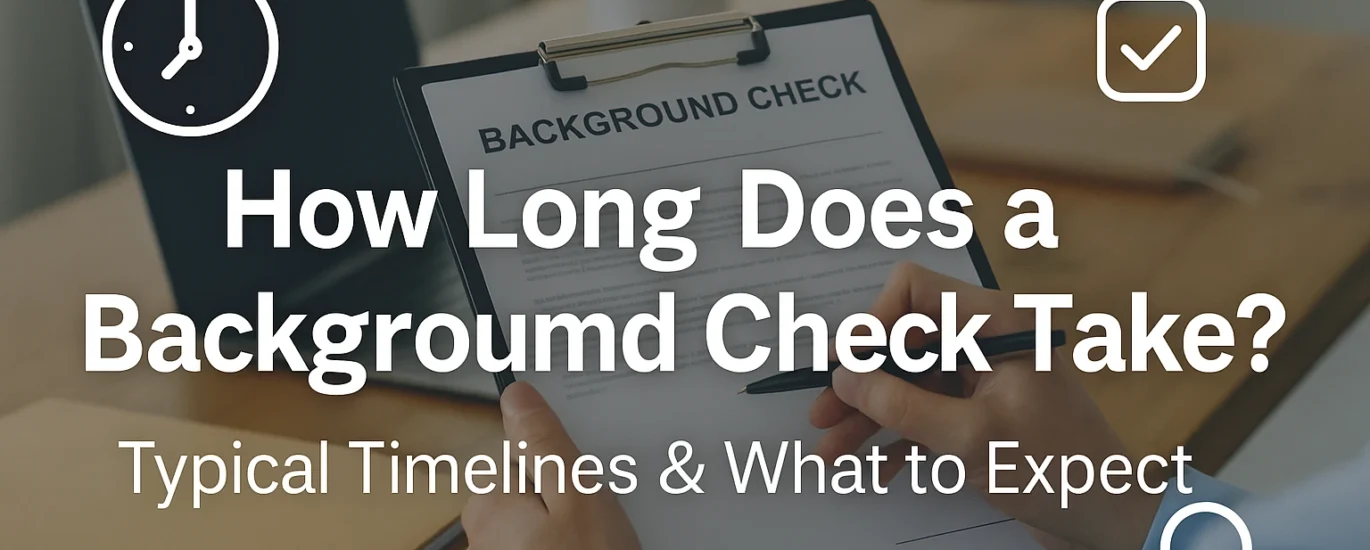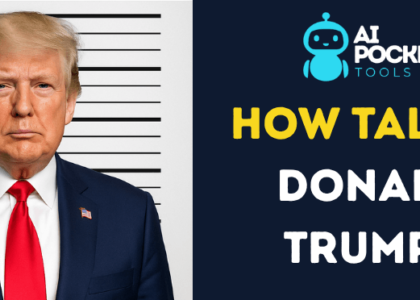If you’re wondering how long a background check takes, you’re not alone. Most employment background checks usually take anywhere from 2 to 7 business days, but the exact time depends on the type of check being done. For example, criminal record checks might be faster, while international or manual verifications can take longer. Factors like accurate information, responsiveness of previous employers, and the background check company’s process also affect the timeline. Understanding these typical timelines can help you manage expectations and prepare better for your job application or hiring process.
Background Check Essentials
A background check is a detailed review of a candidate’s history conducted by employers to confirm their suitability for a job. This typically includes verifying criminal records, employment history, education qualifications, references, and sometimes even credit or driving records. Employers perform these pre-employment screenings to ensure candidates have accurately represented themselves and to maintain workplace safety. Background checks also help organizations comply with laws and reduce risks in the hiring process. Understanding how a background check works can help candidates better prepare and manage their expectations about the hiring timeline, making the entire process smoother and faster.
Typical Durations & Influencing Factors
Background check durations vary by type. Criminal record checks typically take 1–3 business days, employment and education verifications often require 2–5 days, while credit checks can be done within a day. Several factors influence these timelines, including accuracy of provided information, responsiveness of former employers or schools, and whether checks are manual or automated. Geographic location, vendor efficiency, and legal compliance needs can also impact turnaround times, making it important to set realistic expectations during the hiring process.
Average Timeframes for Common Background Check Types
| Background Check Type | Typical Duration | Notes |
|---|---|---|
| Criminal Record Check | 1–3 business days | May take longer if manual searches are needed. |
| Employment Verification | 2–5 business days | Depends on responsiveness of previous employers. |
| Education Verification | 2–5 business days | May delay during school holidays. |
| Reference Checks | 2–5 business days | Varies based on reference availability. |
| Driving Record Check | Minutes to 3 days | Depends on state or country record access. |
| Credit Check | Same day to 1 business day | Often quick if digital records are used. |
| International Background Check | 5–20+ business days | Varies greatly by country and data privacy laws. |
Comprehensive Process Breakdown
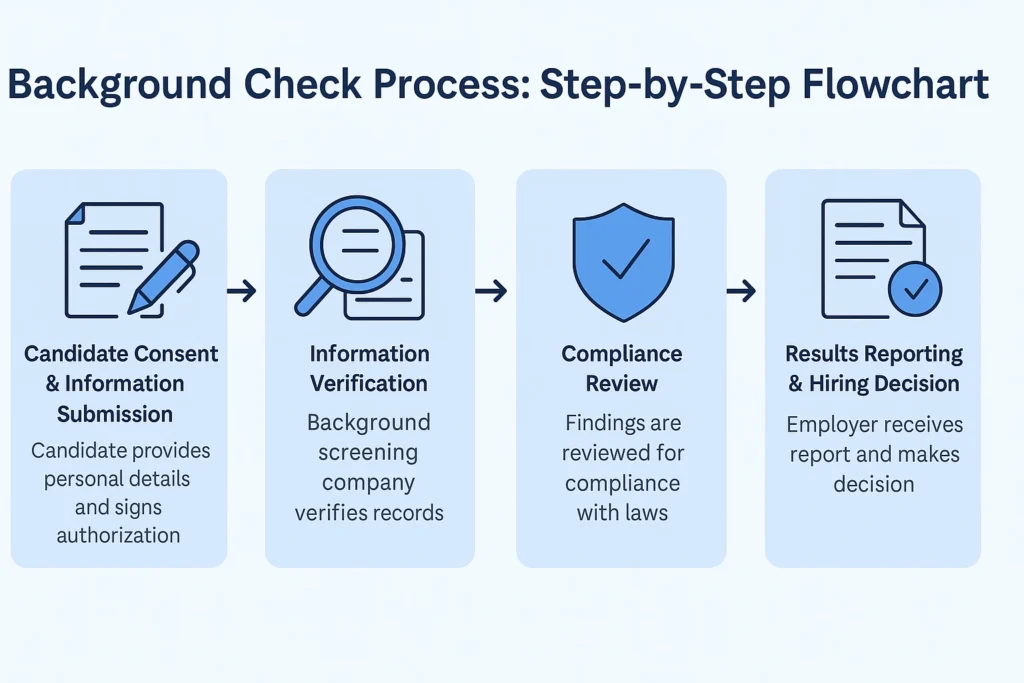
A typical background check involves four key steps. First, candidates give consent and provide personal details. Next, background screening companies or HR departments verify this information through criminal records, employment, education, and references. After verification, findings are reviewed for compliance with hiring laws, like the Fair Credit Reporting Act (FCRA). Finally, employers make hiring decisions based on results and notify candidates of their status. Clearly understanding these steps helps candidates anticipate timelines and reduces uncertainty during the hiring process.
Advanced Factors Affecting Background Check Timeliness
Several advanced factors can affect how quickly background checks are completed. Technological integration matters significantly; automated checks process faster than manual ones. Vendor responsiveness and efficiency also play a crucial role reliable vendors speed things up considerably. Candidate accuracy is another essential factor; incorrect or incomplete information delays verification. Seasonal factors, such as holidays or busy hiring periods, can cause additional delays. Employers aware of these advanced factors can better manage their timelines and candidate expectations.
Navigating International and Cross-Border Background Checks
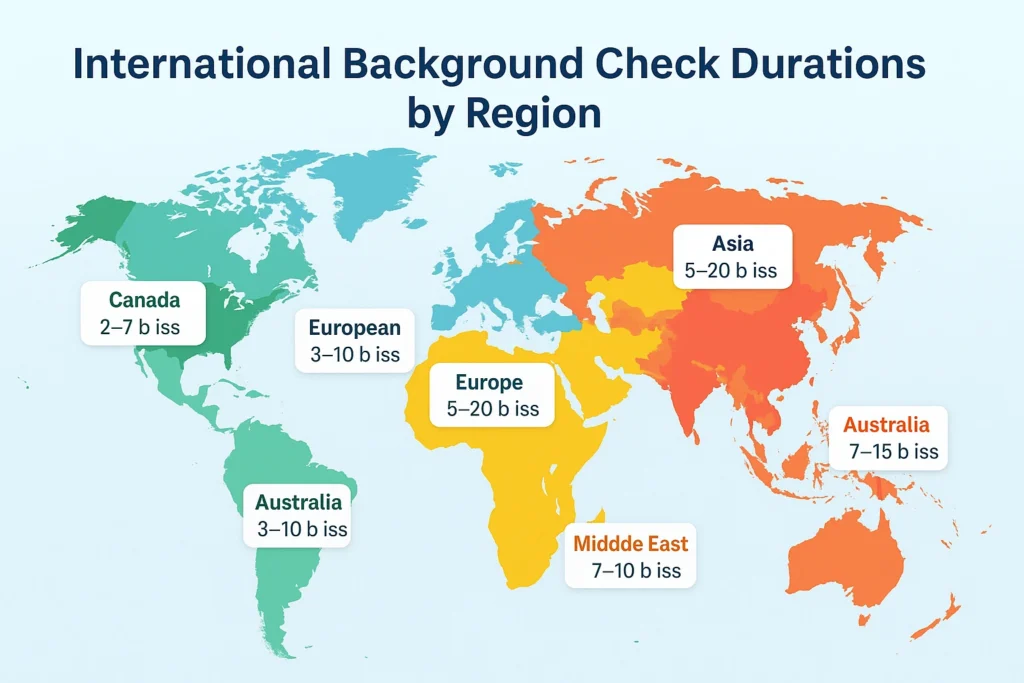
International background checks typically take longer, often 5–20 business days or more, due to differences in laws, processes, and data accessibility across countries. Checks involving Europe must comply with GDPR data privacy regulations, while Asian countries often have varied documentation standards. Employers must be patient and clearly communicate these longer timelines to candidates. Planning ahead, understanding specific regional challenges, and partnering with experienced screening providers can help streamline this complex, yet essential part of the hiring process.
Background Check Timelines by Region
| Region / Country | Typical Duration | Notes |
|---|---|---|
| United States | 2–7 business days | Varies by state and type of check. |
| Canada | 3–10 business days | Depends on provincial regulations. |
| United Kingdom | 5–15 business days | GDPR compliance affects timing. |
| European Union | 5–20 business days | Strict data privacy laws (GDPR) apply. |
| Asia (e.g., India, China) | 7–20+ business days | Varies widely; may require manual verification. |
| Australia | 3–10 business days | Government checks may take longer. |
| Middle East | 7–15 business days | Diverse regulations and record availability. |
Handling Delays & Setting Realistic Expectations
Delays in background checks happen for many reasons, like unresponsive references or incomplete candidate information. Employers should keep candidates informed to reduce frustration.Agreeing on practical deadlines early on makes it easier for everyone to stay on the same page. If checks stall, proactively following up with vendors or institutions can speed things up. Clear communication and patience are key to navigating delays smoothly, ensuring both employers and candidates stay aligned throughout the hiring process without unnecessary stress or confusion.
Innovative Approaches to Streamlining Background Checks
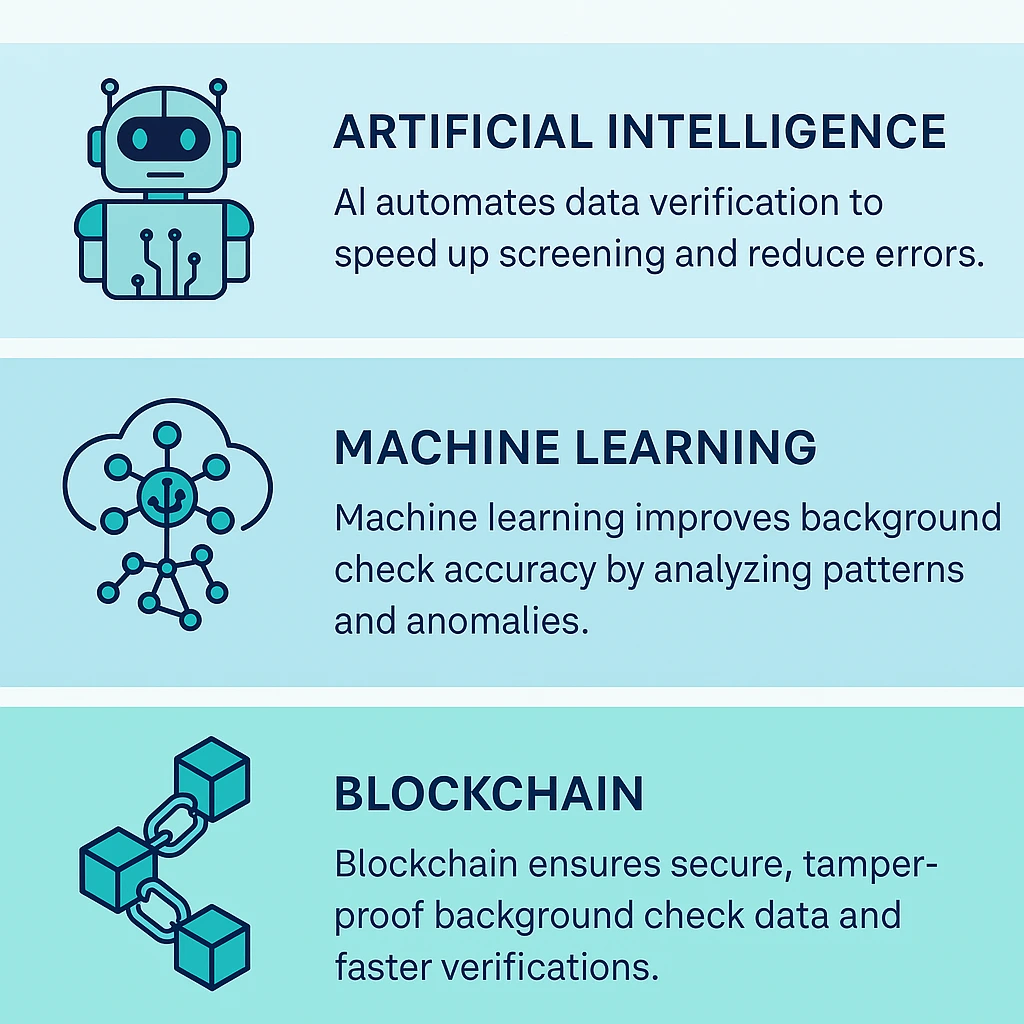
Modern tech tools are speeding up background checks and improving their reliability. Many companies now use AI and machine learning to automate data verification, reducing manual errors and speeding up processing times. Emerging technologies like blockchain offer secure and transparent ways to verify information quickly. By adopting these innovations, employers can improve efficiency, reduce costs, and provide a better experience for candidates. Staying updated on these tools helps organizations stay competitive in today’s fast-paced hiring landscape.
Mitigating Risks What Happens When Checks Go Wrong
Sometimes background checks can produce errors or false positives which may unfairly affect a candidate’s chances. Employers should have clear policies to review and verify any disputed information carefully. Candidates have the right to dispute incorrect results and provide supporting documents. Handling these situations fairly helps maintain trust and compliance with legal standards. Effective risk mitigation ensures hiring decisions are based on accurate data protecting both the company and the candidate from unnecessary harm.
Employer and Candidate Case Studies

Real life examples show how efficient background checks help companies hire the right people quickly. For instance, one company used automated screening to reduce processing time from two weeks to three days. Another case involved a candidate who prepared accurate documents in advance, speeding up verification. These stories highlight the benefits of clear communication, proper preparation, and using technology. Learning from such experiences can help both employers and candidates improve the background check process and avoid common pitfalls.
Real Life Example for Background Check of Employee for Company Hiring
At Tech Solutions Inc., a growing software company, background checks are an essential part of hiring. When Sarah applied for a project manager role, the HR team quickly began verifying her employment history and education. They used an automated screening service to speed up the process. Within five days, Sarah’s background check was complete, confirming her credentials and clean record. This gave the hiring manager confidence to offer her the job. Sarah appreciated the clear communication throughout and was happy the process was quick and transparent, helping her start her new role smoothly.
Background Check Compliance and Efficiency Checklist for Employers
| Checklist Item | Purpose |
|---|---|
| Obtain written candidate consent | Ensures legal compliance with FCRA and other laws. |
| Use a reputable background screening provider | Guarantees accurate and timely check results. |
| Verify candidate information before screening | Reduces delays caused by incorrect or incomplete data. |
| Communicate timelines clearly to candidates | Manages expectations and reduces follow-up inquiries. |
| Regularly audit your background check process | Ensures compliance and identifies areas for improvement. |
| Keep candidate data secure and confidential | Protects privacy and complies with data protection laws. |
| Provide candidates opportunity to dispute results | Maintains fairness and legal compliance. |
| Integrate technology to automate workflows | Improves efficiency and reduces manual errors. |
FAQs Frequently Asked Questions
How long do most employment background checks take?
Most employment background checks take 2 to 7 business days, depending on the type of check and whether it’s automated or manual. International and complex checks may take longer.
What is a red flag in a background check?
A red flag is any issue like criminal records, falsified information, employment gaps, or negative references that may raise concerns for employers during hiring.
How do you know if you would pass a background check?
You can pass a background check if your criminal record is clear, your employment and education details are accurate, and your references respond positively.
Why do background checks take so long?
Delays happen due to slow responses from references, manual record checks, international verifications, incomplete info, or holidays affecting processing time.

